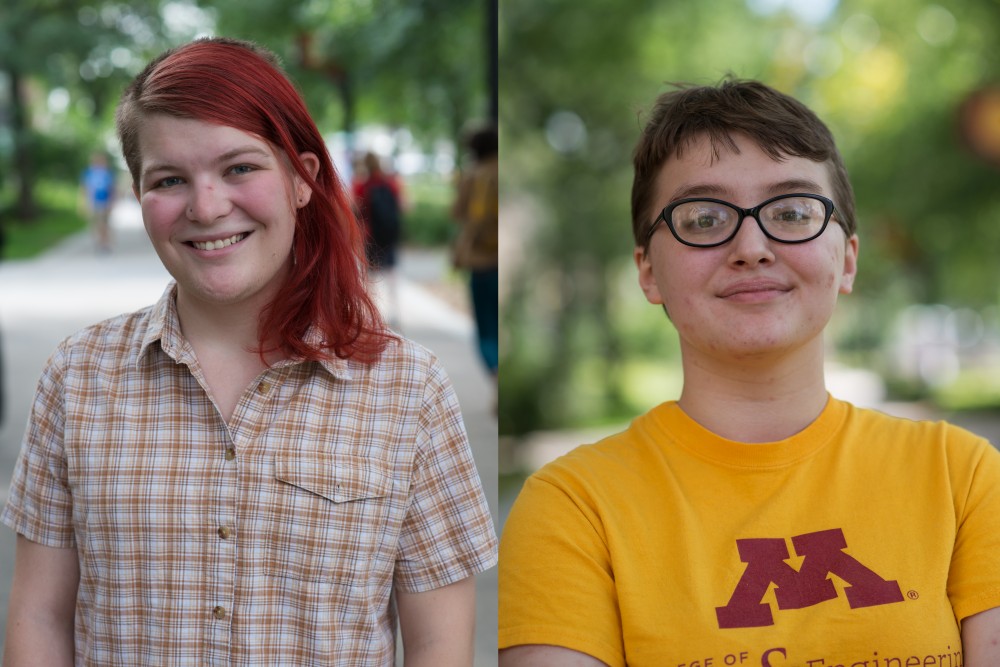In response to concerns about free speech rights and potential disciplinary measures, University of Minnesota officials are reworking a proposed policy that would require University members to use the name, gender identity and pronouns specified by an individual.
After receiving feedback from University members over the past year, the Equal Opportunity and Affirmative Action office drafted the policy in August to clarify more contentious parts of the policy.
The draft aims to prevent misgendering: using incorrect pronouns or the wrong name when referring to an individual.
Advocates of the policy will continue meeting with groups across the University in the coming months, said Tina Marisam, director of the EOAA, at a University Senate committee last week. Marisam said she hopes a final version will be done by the end of the school year.
EOAA and the Gender and Sexuality Center for Queer and Trans Life, among other organizations, wrote the administrative policy to respond to community requests about creating an inclusive environment for transgender and gender nonconforming individuals. Both EOAA and GSC declined interviews because the policy is in draft form.
University senior Luna Johnson, who helps facilitate a non-binary discussion group run by the Queer Student Cultural Center, said some professors have ignored their pronouns, sometimes in a derogatory way.
“It’s just very invalidating when you tell someone what you want to be referred to as and they completely ignore that,” said Johnson. “That’s obviously not a safe environment.”
The proposed policy would also give University members the right to access facilities and programs that match their gender identities, including housing, restrooms and locker rooms.
But the effort has run into opposition and questions about how the policy will be implemented and enforced.
Although supportive of its goals, Joseph Konstan, chair of the Faculty Senate Consultative Committee, said he is concerned the proposed policy could potentially infringement on free speech rights.
“Should you call people what they want to be called? Yes,” Konstan said. “[But] it’s also allowable speech.”
These concerns came to the forefront after the policy received increased publicity over the summer.
Ahmad Qais Munhazim, the former interim director of GSC, said the policy received support when it was presented to groups last year. Although there were some questions about implementation, Munhazim said, the process only took “a controversial turn” when it “became more of a public discussion.”
Members of several University Senate committees expressed support for the policy last year. The Minnesota Student Association and QSCC have also endorsed it.
The new draft is meant to clarify how the University would handle those who don’t follow the rules, Marisam said at the committee meeting.
Inadvertent slip-ups — such as a faculty member mistakenly misgendering a student — would not result in disciplinary actions, Mariam said.
More intentional offenses could violate a pre-existing Board of Regents policy that prohibits discrimination and harassment based on gender identity and expression.
“It only would become an issue of discrimination or harassment in the rare case that the misgendering rose to a level where it was persistent, it was pervasive, it was severe,” Marisam said. “We absolutely recognize this is an area that is new. It’s an area where people make mistakes,” she said.
Konstan said the policy will benefit from more discussion. He said the policy should focus more on helping people grow and less on punishment.
“This [is] a policy that will have no value whatsoever, unless the process of adopting it leads to enough acceptance of it among the members of our community,” Konstan said.
Emmyra Conway, a non-binary, trans woman and University student, said she approves of the policy as it is. She said she sees it as a way to empower students.
“[It] allows students the space and confidence to actually assert themselves when in other situations they might have been afraid they are not going to be respected,” Conway said.
Johnson said they would like the changes to come sooner rather than later, despite some people’s concerns.
“It just sucks how politicized peoples’ identities are,” Johnson said. “We are talking about human beings here.”








